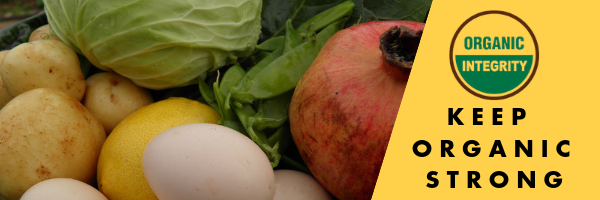03
Apr
A Livable Future Tied to Growth of Organic Land Management with Strong Standards

(Beyond Pesticides, April 3, 2023) The National Organic Standards Board (NOSB) has opened its public comment period, with comments on organic standards due by 11:59 pm EDT April 5. April 5 is also the deadline for registering for the upcoming public comment webinar on April 18 and 20, which precedes the online meeting April 25-27—in which the NOSB deliberates on issues concerning how organic food is produced. Written comments must be submitted through Regulations.gov.
As always, there are many important issues on the NOSB agenda this Spring. For a complete discussion, see Keeping Organic Strong (KOS) and the Spring 2023 issues page, where you can find Beyond Pesticides’ comments on all issues facing the NOSB at this meeting. In the spirit of “continuous improvement,” we urge you to submit comments (please feel free to use our comments on the KOS page) that contribute to an increasingly improved organic production system. If you have already submitted comments on the key issues we have suggested (below), please take a look at the Beyond Pesticides’ KOS page and pick an issue to comment on. (The public is welcome to cut-and-paste from the Beyond Pesticides’ comments posted on its KOS page.) Here are some high priority issues for Beyond Pesticides:
Prohibit the Routine Allowance of Ingredients Processed with Ion Exchange. Because the ion exchange process is a chemical process, all organic ingredients processed in this manner must be subject to review by the NOSB. Ion exchange creates synthetic ingredients through chemical change—removing some components and substituting other chemicals—that are used in processed food. It is not simply filtration. Chemicals in the ion exchange resins may leak into the food product. Yet, the Handling Subcommittee of the NOSB is proposing to allow any and all resins without review. To maintain the integrity of the organic label, resins must be subject to full National List (National List of Allowed and Prohibited Substances) review to determine whether these ingredients meet organic standards, rather than establishing a blanket allowance of ion exchange in organic processing.
Organic Agriculture is Climate-Smart Agriculture. In a draft letter to Secretary of Agriculture Tom Vilsack, the NOSB has written an excellent primer on how organic agriculture responds to the climate emergency. An important caveat is that NOP and certifiers must hold organic producers to the letter and spirit of the Organic Foods Production Act, which requires that organic production be soil-based, incorporate diversity, and protect the environment. Operations based on hydroponics or confined animal facilities, and those that replace native ecosystems with organic farms do not meet those requirements. The NOSB has made its position clear on those issues and must insist that NOP and certifiers carry out NOSB recommendations and consistently enforce the law—for the sake of reducing climate change, biodiversity loss, and human health impacts, as well as fairness. The NOSB should also stress the need for USDA to dramatically increase support for converting chemical-intensive agriculture to organic. It is critical that the National Organic Program ask, “What more should USDA be doing to advance organic?” As the Board states, the resiliency of organic is established: “Organic is the solution to mitigating climate change and responding to it.” However, despite the astronomical growth in organic consumption in the U.S., conversion to organic agriculture lags behind demand. USDA could and should require the adoption of organic/climate-smart practices a prerequisite for receiving the benefits of its programs and abandon its promotion of chemical-intensive agriculture supported by the biotech/chemical industry.
Plastic mulch is under consideration this year as a part of its five-year review cycle. This is part of the larger issue relating to the use of plastic in organic production and handling. Awareness is growing about the impacts of plastic—and the microplastic particles resulting from its use—on human health and the environment. Plastics manufacture requires transportation of hazardous chemicals, such as those involved in the recent derailment in East Palestine, Ohio. Plastic mulch should not be relisted as allowable in organic production. Moreover, the NOSB should initiate action to eliminate all uses of plastic in organic processing and packaging.
The NOSB should use the review (or sunset) process to eliminate nonorganic ingredients in processed organic foods. Materials listed in §205.606 in the organic regulations are nonorganic agricultural ingredients that may comprise 5% of organic-labeled processed foods. The intent of the law is to allow restricted nonorganic ingredients (fully disclosed and limited) when their organic form is not available. However, materials should not remain on §205.606 if they can be supplied organically, and we can now grow virtually anything organically. The Handling Subcommittee needs to ask the question of potential suppliers, “Could you supply the need if the organic form is required?” The materials on §205.606 up for sunset review this year are made from agricultural products that can be supplied organically and thus should be taken off the National List of allowed materials.
Need help in submitting comments? Regulations.gov requires more than a single click, but it is not difficult. Please feel free to cut-and-paste language from the comments above into Regulations.gov and add or adjust the text to personalize it. See this instructional video. (Regulations.gov has changed its look since this video was made.)
Thank you for keeping organic strong!










